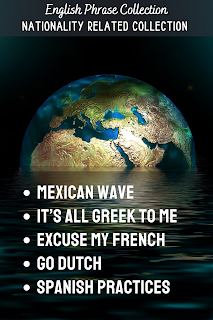Exploring the Fascinating World of Nationality Related Idioms
Mexican wave
First up is the "Mexican wave". This is a term used to describe the phenomenon of a wave of people standing up and sitting down in quick succession at a sporting event or concert. Although it's unclear where the term originated, it's likely that it became popular due to its use at the 1986 World Cup in Mexico. Despite some people finding it controversial, it remains a popular term today.
It's all Greek to me
Another interesting idiom is "it's all Greek to me". This phrase is used to describe something that is incomprehensible or difficult to understand. It's thought to have originated in Shakespeare's play "Julius Caesar", where one of the characters says "Those who understood him smiled at one another and shook their heads; but, for my own part, it was Greek to me." While it may seem derogatory towards Greeks, the idiom has become so ingrained in the English language that it's still used today.
Excuse my French
Another common nationality-related idiom is "excuse my French". This phrase is used to apologize for using curse words or profanity in polite company. Its origins are unclear, but it's thought to have been popularized in the 19th century. While it may seem strange to apologize for using a language other than one's own, the phrase has become a common part of English conversation.
Go Dutch
"Go Dutch" is another interesting idiom. This phrase is used to describe the practice of splitting a bill equally between diners at a restaurant. Its origins are unknown, but it's thought to have arisen due to the stereotype of Dutch people being thrifty and fair-minded. Whether or not this is an accurate portrayal of the Dutch is up for debate, but the idiom remains a popular one nonetheless.
Spanish practices
Finally, we have "Spanish practices". This phrase is used to describe dishonest or unscrupulous business practices. Although it's unclear where the phrase originated, it's thought to be related to the stereotype of Spaniards being dishonest or unreliable. However, it's worth noting that this stereotype is not supported by any actual evidence.
In conclusion, nationality related idioms are an interesting and complex aspect of language. Whether they're humorous, controversial, or simply intriguing, they offer us a unique window into the history and culture of the people who use them.
If you want to learn more about idioms and language in general, be sure to check out our YouTube channel English Phrase Collection and our video on the topic.


No comments:
Post a Comment